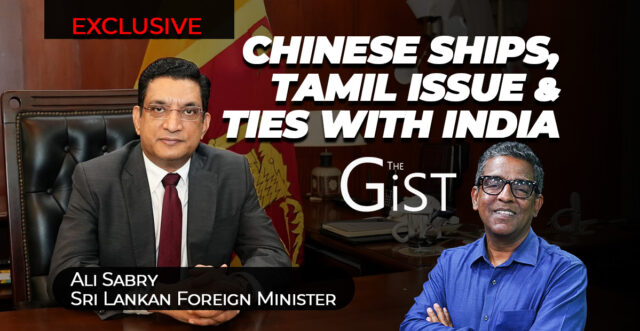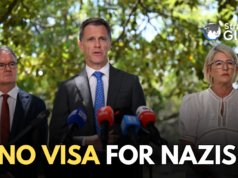The state of Tamils in Sri Lanka has long been a prickly issue between the country’s Sinhalese leadership and India. The latter has often raked up the issue, advocating a system of meaningful devolution of power to minorities and preservation of their rights. Sri Lanka votes later this year in the presidential election.
Political Alignment?
The three major candidates in the fray—incumbent Ranil Wickremesinghe, Opposition leader Sajith Premadasa and AK Dissanayake who heads an alliance called the National People’s Power (NPP)—have openly spoken about devolution of power and retaining provincial councils, says Sri Lankan Foreign Minister Ali Sabry.
Speaking to StratNews Global Editor-in-Chief Nitin A. Gokhale, Sabry called it a huge positive development. “If a meaningful provincial council system is in place, Tamils and minorities will feel they are also part of governance.”
‘Not The Right Thing’
Sabry feels the Lankan Tamils should have long been part of the government. Unfortunately, over a period of 75 years or so, unlike Indian-origin Tamils and Muslims who have been part of the governance with the coalition of the majority, the Tamil leadership have continuously refused to be part of the government at the Centre. “I honestly feel for a minority community, that’s not the right thing to do”. They should have fought for their rights while being part of governance, says Sabry.
A Common Sri Lankan Identity
The Sinhalese, Muslims and Tamils—all are guided by different priorities, says Sabry. The Sinhalese feel Sri Lanka is the only country they have in the whole world. Muslims want religious freedom and for Tamils, culture and language is of utmost importance, he adds. So what’s the answer? “I want a common Sri Lankan identity while preserving everyone’s religious, cultural and linguistic identities.” The upcoming presidential polls will be a milestone in the journey towards reconciliation that is lasting, hopes Sabry.
‘Won’t Harm India’s Interests’
Chinese research ships docking in Sri Lankan waters has been a constant irritant for India. It sees the move as a threat to its national security. There’s buzz that such ships indulge in collecting sensitive data that could be weaponized by China. Earlier this year, Sri Lanka placed a moratorium on the entry of such Chinese vessels after India raised objections. “We will not allow any third party to use our land or waters to be used against the legitimate security interests of India,” says Sabry. Sri Lanka will not allow anyone to have any war games in our neighborhood, he assured. As India works with China at SCO and BRICS, Sri Lanka would like to work with “different partners”.
Economy Looking Up
Sri Lanka’s negotiations with the International Monetary Fund (IMF) have gone well. Any country that enters such negotiations has to chart a difficult course, says Sabry. But he credits President Ranil Wickremesinghe for taking difficult decisions that are paying rich dividends now. Inflation that once stood at 70 per cent came down to 1.67% last month; forex reserves are now close to US $6 billion, says Sabry. “And for the first time in about six years, we have a primary account balance.”
Ties With India
India-Sri Lanka relationship in my assessment is at an all-time high, feels Sabry. The two countries have a long-standing relationship and there have been ups and downs. The way India helped Sri Lanka in 2022 (during the economic crisis) has been etched in our hearts and minds, he adds. And anybody who’s sensible sees an opportunity to tag along with the Indian success story, says Sabry.
Nitin A. Gokhale is a media entrepreneur, one of South Asia's leading strategic affairs analyst and author of over a dozen books so far on military history, insurgencies and wars.
Starting his career in journalism in 1983, he has since led teams of journalists across media platforms.
A specialist in conflict coverage, Gokhale has covered the insurgencies in India’s North-East, the 1999 Kargil conflict and Sri Lanka’s Eelam War IV between 2006-2009.
Gokhale now travels across the globe to speak at seminars and conferences, and lecture at India’s premier defence colleges. He has founded three niche portals, Bharatshakti.in, stratnewsglobal.com and Interstellar.news.





